- Home
- A. G. Riddle
The Extinction Files Box Set Page 16
The Extinction Files Box Set Read online
Page 16
Thirty minutes later, Desmond reached the thicket where he’d been building his fort. Without wasting a second, he set about the hard work of moving stones from the nearly dry creek bed and packing them with mud to form walls. He had left a small hatchet and a shovel in the bush, to help with his work. If his father knew, he would be angry. Desmond made a note to bring them back with him that day.
He didn’t have a watch, but he occasionally glanced up at the sky, dreading midday. In dutiful fashion, Rudolph kept guard while Desmond stacked stone after stone. He was covered from head to toe in mud when the sun told him his time was up.
He wished the creek still flowed, even a trickle to wash his hands with. It had dried up two weeks ago.
He headed back toward the homestead.
The second he cleared the trees, he smelled it: smoke.
Dark clouds rose in the east. A bushfire, moving in from the direction his dad had gone—moving toward their home.
Desmond dropped the hatchet and shovel and ran. He had to get home and warn his family. His father would be okay. He was the toughest man of all time; Desmond was sure of that.
Rudolph was at his heels, barking.
With each step, the wind seemed to gust harder. It whipped at his face. On the ridge to his right, the wind carried the fire, picking it up, tossing it about, slamming it into the land. The blaze danced like a dervish, swirling, jumping, wrapping around trees, turning them into smoke and soot.
At the ridge where he had stopped before, Desmond cried for help, hoping someone would hear him. Smoke surrounded him, a black curtain closing in. And when the wind parted the cloud for a second, Desmond froze, terrified by what he saw.
Flames rose from his home.
He screamed at the top of his lungs. Rudolph whimpered.
Desmond descended into the valley, charging toward the blaze. At the demarcation line where the fire was devouring the tall grass, he stopped and thought for a moment. Rudolph came to a skidding halt beside him, looking around. Quickly, Desmond took the sack from his belt, tore it in two, wrapped it around his forearms, and tied it with the string.
Then he pulled his shirt up to block the smoke and cover his face. He gathered up his courage and ran for his life—for his family’s life—into the blaze.
The first few steps into the fire didn’t faze him. Adrenaline fueled him. The flames singed the hair on his legs. Black ash and red coal kicked up in his wake, tiny specks stinging as they hit him.
When the bottom of his shoes melted, the pain took over. He screamed, almost fell. The fire was only waist high, and through a break in the smoke he saw his home’s roof fall in, the flames devouring it. And with it, a little piece of him caved in too: an emotional wall, a hope he had held out. He screamed at the top of his lungs for the pain in his body—and in his heart.
He turned and ran out of the fire, not as fast as before, his legs shaking now. He screamed for help again, hoping, expecting his father to ride through the fire on his horse, throw him on the back, and charge out of the agonizing inferno.
But he never came.
Desmond’s feet failed him. He wasn’t going to make it. He could hear Rudolph barking. He pushed on toward the sound. He was lost in the smoke cloud. He felt dizzy, like he was going to pass out. Smoke filled his mouth, smothered him. He coughed, doubled over, but the heat of the flames near his waist propelled him back up. He couldn’t think. His pace slowed. He was walking now.
Through a break in the flames, he saw Rudolph, dancing across the singed ground, barking. The sight gave Desmond a burst of energy. He pushed himself, dashed with the last bit of strength he had.
He fell the second he cleared the fire. The simmering coals on the burned ground were digging into his legs. He began crawling, the sack wrapped around his forearms sparing them the agony his legs endured. Rudolph whimpered, licked his blackened, soot-covered face, encouraging him.
Right before Desmond passed out, he thought, I failed. I could have saved them. I should have saved them.
When he awoke, he still had the smell of smoke in his nose—and the taste in his mouth. His body ached, legs burned as if the fire were still roasting them. As he acclimated to the pain, he realized something was on his chest: a cold metal disc. He opened his eyes, which were watery and irritated from the smoke. A brown-haired woman, maybe in her early twenties, leaned over him, listening to a stethoscope. Desmond thought she was incredibly beautiful.
She smiled. “Hi.”
Desmond looked around. He was in a large room with heavy blankets on the floor. White bedsheets hung from twine pulled tight, held with clothespins, loosely separating several makeshift beds from one another.
It was night; he could tell from the air. There was no power where they were. Gas lanterns lit the place.
At the end of the row of white sheets, he saw a blackboard with letters of the alphabet strung across the top.
A classroom. At the school where he would start soon. Or would have.
Moans and cries rose from every corner, seeming to have no point of origin. Screams erupted every now and then. And the smell… it was like nothing Desmond had ever experienced. A barbecue came the closest, but this was different. And he knew why. When animals were slaughtered, the organs and fluid were discarded before the meat was cooked. But here… the fire was indiscriminate. The smells assaulted him. Charcoal. Sweet perfume. Burned fat. Copper. And rot, like a carcass shut up in the barn for a few days.
When his eyes returned to the woman, she said. “You’re going to be all right, Desmond. You were very lucky.”
He didn’t feel very lucky.
“Where’s my family?”
Her smile disappeared. He knew before she told him. He closed his eyes and cried. He didn’t care who saw him.
She returned just before lunch the next day, performed an examination as she had the night before, and changed the bandages covering his legs and a few other places. He gritted his teeth through the pain, but never cried out. From the look on her face, he thought the episode might have caused her more anguish than him.
She told him her name was Charlotte and that she was a volunteer, one of many working in southeast Australia in the wake of the deadly bushfires.
“What will happen to me?”
“We’ll be contacting your next-of-kin. They’ll be around to collect you shortly.”
“I don’t have a next-of-kin.”
Charlotte paused. “Well. Not to worry. We’ll sort it out.”
The other volunteers who had come through that morning had looked at him with sorrow in their eyes. They saw a broken, homeless orphan. Some averted their eyes as they distributed food and water and changed blankets and bedpans. It was as if seeing him could hurt them. Maybe it did. Maybe the more tragedy they saw, the more they felt, the more they hurt. Desmond didn’t blame them. And he always thanked them. His mother was particular about his manners.
Charlotte was different. She looked at him the way people did before, like he was just a normal boy, like there was nothing wrong with him at all. That made him feel good.
Desmond lay there after she left, staring at the ceiling, listening to the news program that played on the radio owned by the elderly man across the aisle.
“Officials continue to assess the toll of the Ash Wednesday bushfires in southeastern Australia. At least seventy are dead, thousands are injured, and property losses are expected to reach into the hundreds of millions. In Victoria alone, over half a million acres burned yesterday. Over a million acres are expected to burn this season. Livestock losses are very high. More than three hundred thousand sheep have been lost, and nearly twenty thousand cattle. For the first time in its history, South Australia has declared a state of emergency.
“Fire crews are still battling the flames. They’re getting a lot of help, too. Volunteers from around the country are pouring into the region. Over a hundred thousand are expected to join the effort, including military, relief workers, and others.
“The source of the fires is not known at this time, but the extreme drought conditions are no doubt a factor. Wind gusts and dust storms have also contributed. We’ve heard reports of road surfaces bubbling and catching fire, sand turning to glass, and steaks in a deep freezer turning up cooked well done…”
That afternoon Charlotte returned with a gift. She had even wrapped it in newspaper.
“Sorry, best I could do.”
Desmond tore into the gift, then tried to hide his disappointment as he turned the books over in his hands, gazing at the covers.
“What’s the matter?” Charlotte asked.
“I can’t read.”
She was instantly embarrassed. “Oh. Oh, right. Of course.”
“I’m only five.”
“Is that so?” Her tone implied surprise. “I just assumed you were older.”
Desmond liked that very much.
“Well, I’ll just have to read them to you.” She paused. “If you can bear it, of course.”
A few minutes later, Desmond was lost in the story world, the horror around him forgotten, the stench extinguished. Even the moans of the people sharing the room faded away—until a tall, black-haired man interrupted. He was roughly Charlotte’s age, and he stood in the aisle gazing at her in a way that made Desmond want to get up and block his view.
“You coming, Charlotte?”
“No. You go ahead.”
“You were off an hour ago, dear.”
Desmond hated the way he said dear.
“I know. Gonna stay a bit longer.”
“I’ll wait for you.”
“Don’t.”
The man exhaled deeply, the way Desmond’s father always did when dealing with a stubborn horse.
When he was gone, Charlotte continued reading as if there had been no interruption.
They were halfway through the story when she closed the book.
“Bedtime, Des.”
She tucked him in and brushed his blond hair out of his face, then turned off the kerosene lantern. It was his first good night of sleep since the fire.
The next morning he had hoped to continue the book, but Charlotte had another surprise. She brought around a wheelchair and asked if he’d like to get outside for some fresh air.
She didn’t have to ask twice.
She pushed him out of the room, down the hall, and outside. The February sun felt good on Desmond’s face. It had been a hot summer, one Australia would remember for a long time to come. He let the wind whip at his face and toss his hair about as he inhaled deeply, thankful to take a breath not tainted by the smell of death.
He propelled the wheelchair himself after that, glad for the freedom. His feet were still healing. The doctors had assured him he’d make a full recovery.
“You’ll be walking around again in no time,” they promised him. He couldn’t wait. He’d had no idea how precious a gift walking was until then.
Charlotte returned in the late afternoon and read to him until lights out. That became their pattern: a field trip in the morning, reading until bedtime.
A week later, Desmond again asked her what would happen to him.
“We’re working on it, Des. Nothing for you to worry about.”
Slowly, as the days went by, he got his feet under him again. He began to rove around the school without the wheelchair. He toured the cafeteria, the other classrooms, even the teachers’ lounge, the idea of which thrilled him. In reality it was rather unimpressive.
He even volunteered, helping prepare the meals. The overweight cook had handed him a metal ladle and dubbed him the “souper scooper.” The man let out a hacking laugh that turned into a cough every time he said it. Despite that, Desmond rather liked the bloke.
He was walking back to his bed when he heard Charlotte’s voice coming from one of the offices they’d set up in another converted classroom. She was upset.
“You have to.”
A pause.
“No, sir. You have to take him. We’ve tried—”
Another pause.
“Yes, that’s correct. You’re the only family he has.”
He heard a phone placed on the receiver and her crying after that. He was about to go into the room when he heard the black-haired man’s voice.
“You’re getting too attached, Charlotte.”
Desmond couldn’t make out her muffled response, but the man did. And he didn’t like it. His tone turned hard.
“I know what you’re thinking.”
“I doubt that,” she shot back.
“You’re thinking about adopting him.”
A pause.
“You are. Have you lost your mind?”
“What would be so bad about that?”
“Oh, I don’t know, where do I start? Are you going to put medical school on hold? How will you support him? Ask your parents for money? Will I have to support him? Were you even going to consult me?”
They argued after that, said terrible things to each other. Desmond could barely stand to listen, but he couldn’t back away. The words burned like the flames that had seared his legs.
Charlotte was different when she returned that afternoon. Sad. More reserved.
She read the books as if someone were forcing her to, not like before, when she had done the voices that made the stories come alive.
That made him sad all over again.
The next morning, she was at his bed when he woke up.
“We’ve sorted out your living situation.”
She swallowed, collected herself, then told Desmond two things he already knew: that his father was originally from England, and that his father’s parents, Desmond’s grandparents, had passed away a long time ago.
Then she told him something he didn’t know.
“Your father has a brother—Orville. They… weren’t on the best of terms. However, he’s agreed to take custody of you.”
Desmond nodded, unsure what to say.
“Will I…” He wanted to ask whether he would see her again.
She shook her head slightly. A tear formed in the corner of her eye.
“I’ll be taking you to Melbourne in two days, to the airport. You’ll fly to Oklahoma City. It’s in America.” She swallowed, forced a smile, and tried but failed to make her tone light. “Have you heard of it?”
Desmond shook his head.
He expected her to leave after that, but she stayed. She read to him again, and her passion had returned. She did the voices he liked, asked him what he thought was going to happen when the story was getting good, and read the chapter titles in a special voice.
She returned the next morning, and didn’t leave until she turned the light out.
He never saw the black-haired man again, which didn’t bother Desmond one bit. Good riddance.
Charlotte drove him to the airport, kissed him on his forehead, and handed him a bag that was filled with clothes. They were new, and he got the impression that Charlotte had picked them out.
“Something to send you on your way, Des.”
He wanted to say something, but she was already starting to cry.
“Thank you,” he said.
“Oh, now. It was no trouble.” She was struggling to maintain her composure. She wiped away three tears racing down her cheek and set a hand on his shoulder. “Better run along, Des. Don’t want to miss your flight.”
A woman from the airline who had been briefed on his situation took his hand and began escorting him through security. When Desmond looked back, Charlotte was still standing there, sobbing, waving to him.
The man who greeted Desmond in Oklahoma City was a sharp contrast to Charlotte. That made Desmond miss her even more.
Chapter 31
Millen Thomas opened his eyes and squinted. Even muted through the tent’s canvas, the morning sun was still blinding. Hannah lay on the cot right beside him, sleeping peacefully. Her breathing was barely audible. Her body was warm to the touch, and for a moment, he wondered how she could sl
eep in the heat. Then he remembered how exhausted they had been the night before.
He gently drew his arm from around her stomach, pausing twice, scared he had woken her. But she didn’t move or wake. He rose from the cot and pulled the thin sheet over her. His body smelled of the heinous ointment she had applied so liberally the night before. It had rubbed off on him, and so had the stench. Worth it, he thought. Totally worth it.
Fifteen minutes later, he had eaten and prepared for the day. He stood at the old Toyota SUV with Kito, the local guide the Kenyan government had supplied. A map of the region was spread out on the hood.
Kito pointed. “I would start with the caves in this region, Dr. Thomas.”
“Call me Millen. Why there?”
“Less likely to be lions.”
That was a good enough reason for Millen. He still remembered the movie The Ghost and the Darkness, a fictionalized account of the true story of two lions who killed dozens of people in Tsavo, Kenya, at the turn of the century.
“I like the less lions plan,” Millen said.
He walked over to Dr. Shaw’s tent, stuck his head in, and to his surprise, found her sleeping on her cot. Dr. Becker sat on the other cot staring at his open laptop. The German man raised a finger to his lips, silently urging Millen to remain quiet, then rose and led him away from the tent.
“What’s up?”
“I’m heading out.” Millen glanced back at the tent. “Is she all right?”
“She’s just tired. Long night. You know where you’re going?”
“Yeah. We’ve plotted the caves, should be back well before nightfall.”
“Good. Make sure of it. Take your time inside; a fall could be deadly. If you have to go deep, the radios may not work. Once you have the samples, get out. There’ll be time for sightseeing when this is all over.”
“Will do.”
“Good luck, Millen.”

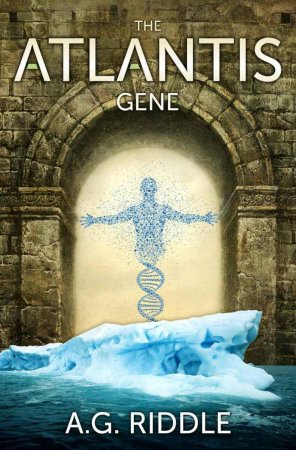 The Atlantis Gene: A Thriller
The Atlantis Gene: A Thriller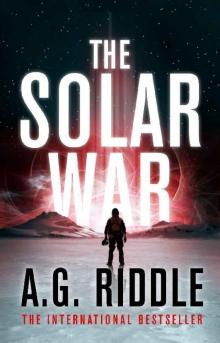 The Solar War (The Long Winter Book 2)
The Solar War (The Long Winter Book 2) The Extinction Files Box Set
The Extinction Files Box Set The Atlantis Trilogy Box Set- The Complete Series
The Atlantis Trilogy Box Set- The Complete Series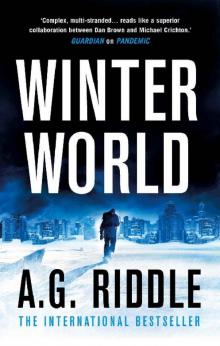 Winter World
Winter World Genome
Genome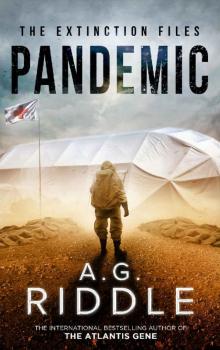 Pandemic (The Extinction Files Book 1)
Pandemic (The Extinction Files Book 1)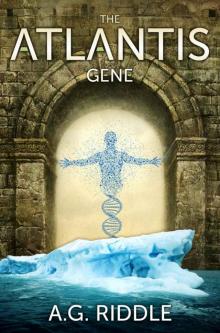 The Atlantis Gene: A Thriller (The Origin Mystery, Book 1)
The Atlantis Gene: A Thriller (The Origin Mystery, Book 1)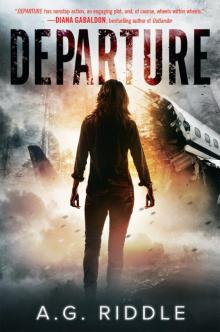 Departure
Departure Genome (The Extinction Files Book 2)
Genome (The Extinction Files Book 2)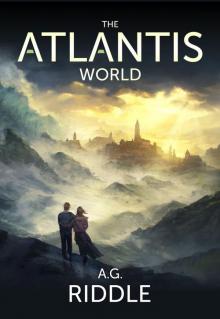 The Atlantis World (The Origin Mystery, Book 3)
The Atlantis World (The Origin Mystery, Book 3)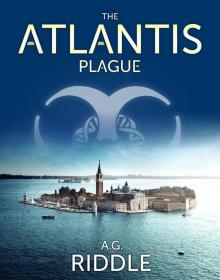 The Atlantis Plague: A Thriller (The Origin Mystery, Book 2)
The Atlantis Plague: A Thriller (The Origin Mystery, Book 2)